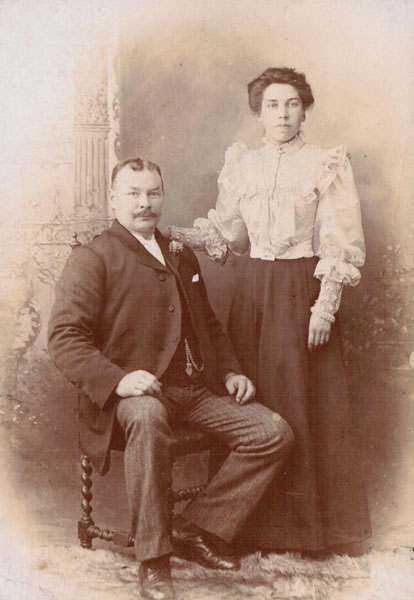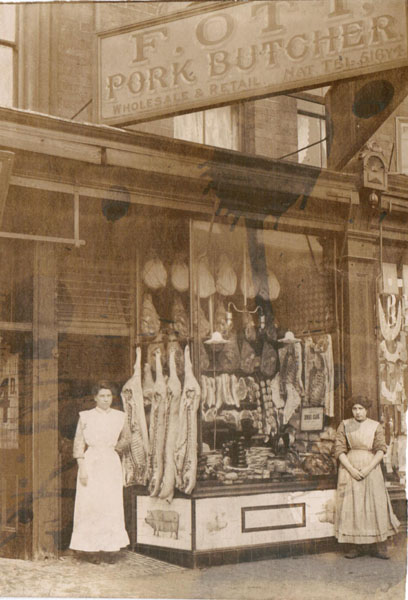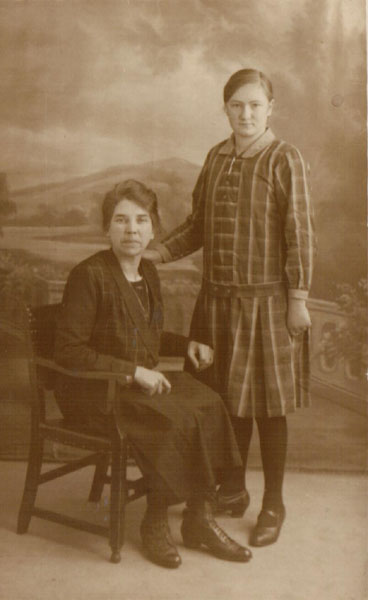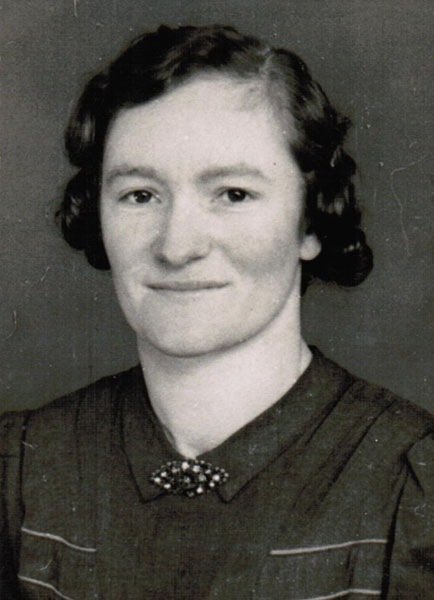
Frederick and Clara Ott in 1910

Ott's Butchers shop, Hull in 1910
The shop was at 464 Hessle Road (on the south side).
It does look very much like Clara standing in the doorway.

Clara and Rosine Ott in 1929

Rosine Ott in 1945

Sidney and Rosine Harsley on their wedding day 1946 - taken outside their house, 2 High Street
The bridesmaid is probably Eileen Binns.
Rosine
Harsley (also known as Rosie or Rösle) was born in 1915 in Stachenhausen,
a small village in Württemburg, West Germany and was one of 9 children
living and working on a small farm. Her uncle, Johann Frederich Ott had
already gone to live in England in 1890 when he was 19 years old and
worked for a butcher in Bradford. He married Clara Bulmer and moved to
Hill Top, North End,
Withernwick, where they had a small holding with several fields,
kept pigs and goats and ran a butcher's shop on Holderness Road, Hull.
They didn't have any children and on one of his trips back to Germany,
uncle Frederich and auntie Clara asked if Rosine could come to England and
live with them as their own child. Rosine was working as a children's
nanny in the village at the time and was persuaded to go to live in
another country thinking of it as a new adventure.
So,
in October 1929 at the age of 14 , Rosine was put on a train at Heidelberg
and travelled to Harwich, England,
where her aunt and uncle were waiting for her. She was very
homesick , missed her family, and found life very hard with her aunt and
uncle especially as she couldn't speak any English. Every night by
candlelight her uncle would read the newspaper to her and taught her to
understand and speak English, but her aunt resented her being there and
whenever they went to visit someone in the village Rosine had to wait
outside while her aunt went inside. She
would take goats' milk to people in the village and got to know Mary
Cherry who lived with her aunt (Nanna Dunn) in High Street and this
started a life-long friendship.
She
was a conscientious letter writer all her life and at this time it was
very important for
her to be able to keep in constant
touch with her family back in Germany. In May 1935 she returned to
Germany for a six weeks' holiday and her first visit after leaving home.
She enjoyed being back so much that she didn't really want to go back to
England again. However,
her mother persuaded her to return to England since her uncle needed her
and missed her so much. She reluctantly went back in July 1935 and carried
on with her life as before.
Then,
four years later in September 1939 WW2 started and in May 1940 she
was interned on the Isle of Man working at the Station Hotel in Port Erin.
Sadly while she was away and only 3 months after leaving England, her
uncle Frederich suddenly died. She was devastated and realised just how
uncertain her future life was to be. Finally,
in June 1941 she was allowed to return to England to live with her aunt
Clara in Withernwick once again. At times she felt very conscious of her
German accent , but people were kind to her and she got to know Sidney
Harsley (as she always said "the boy down the road ") better. On
2nd March 1946 they were married and Rosine became British. They
went to live at 2,High Street and Rosine felt that at long last her
life was settled. She was very happy to be with a husband whom she
loved and when later Rosemarie and Carroll were
born her life was fulfilled.
Through
all the years of uncertainty she never stopped writing to her family in
Germany and later on had regular visits to see them always going back to
the village where she was born. She was always able to speak German, but
England had became her home and she settled down to village life in
Withernwick.
She
remained a quiet person, but always ready and willing to help anyone,
young or old , when they needed it and she never asked for thanks
or a reward.
She didn't
think badly of anyone. She was an active member of the chapel and
later of the Derby and Joan club. She was never one for being upfront or
making speeches and you would always find her at
chapel activities in the kitchen making
tea or washing-up. Her faith remained an important part of her life
up to the end.